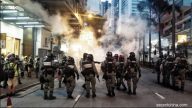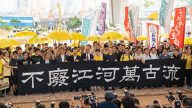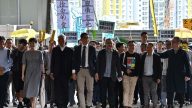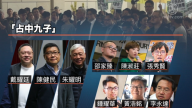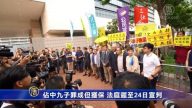【新唐人2014年09月29日訊】日前,中共最高領導人習近平在接見台灣統一派團體時表示,「和平統一、一國兩制」是解決台灣問題的基本方針,此言引起台灣朝野強烈反彈。台灣專家表示,除了歷史上多次國共合作的謊言給了台灣教訓外,香港的現狀更告訴台灣人,一國兩制已經徹底失敗。
9月26號,中共總書記習近平在北京人民大會堂會見台灣統一派團體時強調:「和平統一、一國兩制」是解決台灣問題的基本方針。習近平還說,這對台灣來說,是福音、是歷史機遇。
而台灣馬英九政府火速響應,「一國兩制」的說法,政府或人民都無法接受。
台灣行政院長江宜樺在接受質詢時表示,「中華民國從來不接受一國兩制的政策」 。
臺聯主席黃昆輝則指出,香港的一國兩制已經證明徹底失敗,所謂一國兩制根本是一場騙局,香港不僅離民主遙不可及,言論自由還受到暴力威脅,「台灣人沒那麼好騙」。
時政評論員藍述:「台灣人不願意搞一國兩制是毫無疑問的,香港就是一個榜樣,任何一個民主制度下的老百姓享受了民主的好處之後,他最相信的就是自己手裡的選票,中國大陸和台灣最終的出路不是一國兩制,而是一國一制,這個一制就是民主制度。」
對於用「一國兩制」來解決台灣問題,台灣中央研究院副研究員黃國昌批評說,如此愚蠢可笑的談話,留給本來就決定去抱中共大腿的奴才聽聽就可以了,實在沒有必要公開來自取其辱。
台灣國立政治大學國際關係研究中心主任嚴震生:「如果大陸民主之後,當然有一些人願意接受(統一),那這個還是要有一段時間。大家相信說,對大陸也要民主我們的民主才會有保證,更重要的是,現在台灣我們的前途是由2,300萬人決定,除非台灣今天多數人支持統一,大陸也投票支持統一。」
近幾個月以來,香港民眾的佔中運動如火如荼。運動反對中共指定香港特首,爭取真普選。特別是今年8月底,北京當局通過《全國人民代表大會常務委員會關於香港特別行政區行政長官普選問題和2016年立法會產生辦法的決定》後,香港民眾對真普選徹底失去信心。
香港大學最近公布的民意調查顯示,港人對「一國兩制」失去信心的比例,由6月份的46.1%,躍升到9月調查的56.3%,這是從1993年這項民調開始進行以來,比例最高的一次。而越年輕的港人越不信任北京當局,年輕人對「一國兩制」沒信心的比例更高達85%。
而據香港媒體消息,香港政府在逮捕了數名參與佔中運動的學生,教授和議員後,還使用催淚彈,胡椒水等驅趕佔中民眾。
民進黨立委蔡其昌:「香港的現況已經讓一國兩制徹底破滅,香港人已經用行動正式拒絕一國兩制,也告知世人(這)是一條行不通的道路。」
今年3月18號,台灣大學生和公民,共同發起了佔領中華民國立法院的太陽花運動,來反對國民黨立法委員張慶忠,以30秒之速草率宣佈完成的 《海峽兩岸服務貿易協議》委員會審查。
臺聯黨團副秘書長周美里:「在各種民調中都顯示出,希望跟中國(共)統一的從來都沒有超過20%,就是現在統一的也沒有超過10%,一國兩制在國際上在歷史上也夠慘的,看看現在香港的狀況,更不要說長期以來中共的騙術就一而再再而三的發生。50年前,他們就對西藏簽署了17點和平協議,也還是中共撕毀了17點和平協議。」
馬英九表示,中共提出的一國兩制構想,目標是台灣,並不是香港,但台灣很清楚地表達,「不接受一國兩制」。
採訪編輯/劉惠 後製/肖顏
Hong Kong Situation Alerts Taiwan “One Country, Two Systems”
Is a Complete Failure
Recently, when Xi Jinping met met the faction that supports
Taiwan being united with China,
Xi said that “Peaceful reunification; one country, two systems”
is the basic principle to solve Taiwan’s problems.
Xi’s comments have triggered strong reaction in Taiwan.
Besides many lessons that Taiwan learned
from Kuomintang and Communist cooperation in the past,
Hong Kong’s current situation also tells Taiwan
that “one country, two systems” is a complete failure.
On Sep 26, Xi Jinping, the party’s General Secretary,
met the faction that supports Taiwan being united with China,
in Beijing’s National Grand Hall.
Xi stated that “Peaceful reunification; one country, two systems”
is the basic principle to solve Taiwan’s problems.
Xi Jinping also said it’s a good historic opportunity for Taiwan.
Whereas, Ma Yingjiu government quickly responded
“one country, two systems” is not acceptable
to Taiwan government or it’s people.
Jiang Yihua, Taiwan Executive Dean, said
“Taiwan will never accept ‘one country, two systems’.”
Huang Kunhui, Taiwan Solidarity Union Chairman,
stated that Hong Kong’s “one country, two systems”
proved to be a complete failure.
“One country, two systems” is nothing but a game of bluff.
Hong Kong is so far away from democracy right now.
Their freedom of speech is threatened by violence.
“Taiwan people aren’t that easily tricked.”
Commentator Lan Shu: “There is no doubt that Taiwan
doesn’t like ‘one country, two systems’.
Hong Kong set up an example.
In any democratic system, people trust their votes most
after they learn the benefits of democracy.
The way out for China and Taiwan is not
‘one country, two systems’ but ‘one country, one system’,
which is a democratic system.”
Huang Guochang, associate Taiwan Central Research Institute,
criticized that such ridiculous conversations
shouldn’t be publicized to invite humiliation.
The words should be only confined to those underlings
who fawn on the party.
Yan Zhengshen, Director of International Relations Research
Center,Taiwan National Chengchi University,
“If China becomes a democratic country,
of course some people are willing to be united.
However, it’ll take a while to realize it.
We believe that only if China is democratic,
will our democracy be guaranteed.
What’s more important, the fate of Taiwan
is up to its 23 million people.
Most people have to support Taiwan being united
to make it possible. ”
In recent months, Hong Kong’s Occupy Central movement
is rolling full steam. The movement opposes the Party
designating Hong Kong’s Executive Chief
and demands real universal suffrage.
After Beijing passed the resolution “A Decision by the NPC
Standing Committee on Suffrage of Chief Executive and
2016 Legislative Council in Hong Kong”, Hong Kong people
totally lost confidence in the possibility of real universal suffrage.
Hong Kong University recently published an opinion poll,
showing that the percentage of people that lost confidence
in “one country, two systems” increased from June 46.1%
to September 56.3%. It has reached a record high since 1993.
The poll result shows most young people lost their trust in the party.
As many as 85% of young people don’t have confidence
in “one country, two systems”.
As reported by Hong Kong media, Hong Kong government
arrested a number of students, professors and senators
who participated in the “Occupy Central Movement”.
The police also used tear gas and pepper spray to disperse others.
Cai Qichang, Democratic Progressive Party legislator,
“Hong Kong’s current situation shows ‘one country, two systems’
completely shattered. Hong Kong people have started taking
action to reject the ‘one country, two systems’.
They also tell people that it’s not a feasible way. ”
Mar 18, Taiwan college students and citizens initiated a
“Sunflower Movement” to occupy Taiwan Legislative Hall
to protest against Legislator Chang Qingzhong.
The trigger was that Chang carelessly completed the censorship
on “the Cross-Strait Service Trade Agreement”
by only taking 30 seconds to wrap it up.
Zhou Meili, Deputy Secretary General of the TSU,
“All opinion polls show that the percentage of people
who support being united with China has never surpassed 20%.
Right now it’s even less than 10%. “One country, two systems”
ended sadly. Look at Hong Kong now.
The communist party always plays tricks.
50 years ago, the party signed 17 pieces of peace agreement,
which the party tore to shreds later by itself.”
Ma Yingjiu stated that the party’s “One country, two systems”
aimed at Taiwan not Hong Kong.
But Taiwan clearly responded that “we won’t accept it”.
Interview & Edit/LiuHui Post-Production/XiaoYan



